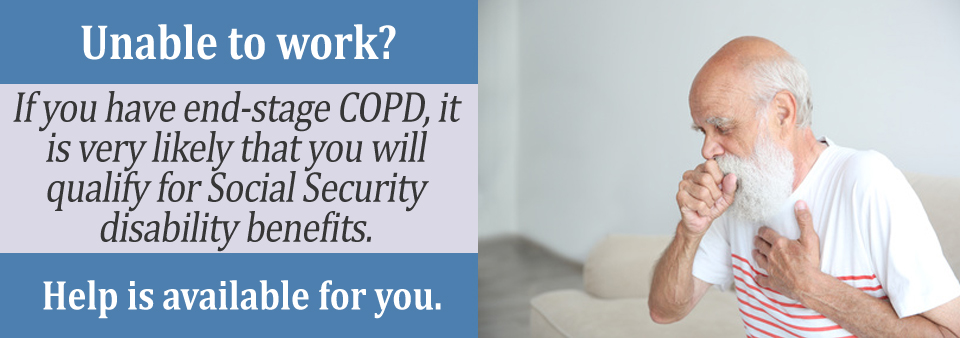If you suffer from Chronic Obstructive Pulmonary Disease (COPD) and it has made working impossible for you, you might be eligible to receive Social Security disability benefits. If your condition is severe enough, or if it has been proven to be triggered by stress such as the stress that can be triggered by office work, you might be approved for benefits.
The Social Security Administration (SSA) has laid out the criteria for COPD to be automatically considered as a disability. If your COPD meets the listing requirements, then the SSA will not evaluate your condition to see if it restricts your functional capacity severely enough for you to qualify for disability benefits. Instead, if your condition meets the listing criteria, you will be approved for benefits.
Meeting the Chronic Pulmonary Insufficiency Listing
To meet the criteria for COPD, you will need to meet the chronic pulmonary insufficiency listing. You will have to undergo a lung functioning test and it must reveal very limited airflow. You must have been diagnosed with COPD and the SSA will send you for a lung functioning test performed by a consulting doctor. There are four different tests available, but the SSA wants to see the results of one of these tests:

- An oxygen saturation test (SpO2)
- An ABG test, which measures the partial pressure of oxygen (PaO2) in the blood as well as carbon dioxide (PaCO2) in the blood
- A DLCO test to measure the amount of oxygen that passes into the blood
- A spirometry test that measures your forced expiratory volume in a second (FEV1) or your forced vital capacity (FVC)
The listing has different tables that are based on gender, age, and height. Each table has the lung function values that are required to meet the disability classification for each of the different functioning tests. If you meet those lung function values, your claim should be approved just so long as you are not working enough to exceed the limits for substantial gainful activity (SGA). Even if you meet the test requirements, your claim will be denied if you are earning too much.
Disabled But Not Meeting the Criteria
If you are unable to work but do not meet the criteria of the listing, you can still be approved for benefits using the medical-vocational allowance and by considering your other medical conditions. As an example, a residual functional capacity (RFC) will show how your condition limits your ability to work and perform other activities. If you can show that your conditions limit your ability to work and make it impossible for you to perform any job, you can be approved for disability benefits. As an example, if your condition makes it impossible for you to lift more than 10 pounds, walk or stand for no more than an hour at a time, or be exposed to dust or fumes, that should be indicated in your RFC. The SSA will go over your medical records to create an RFC.
Consult With a Disability Attorney
If you are unable to work because of COPD, you should consult with a disability attorney who will review your claim and determine the best way to proceed with your case. Connect with a Social Security disability attorney or advocate in your area by filling out our Free Disability Evaluation.